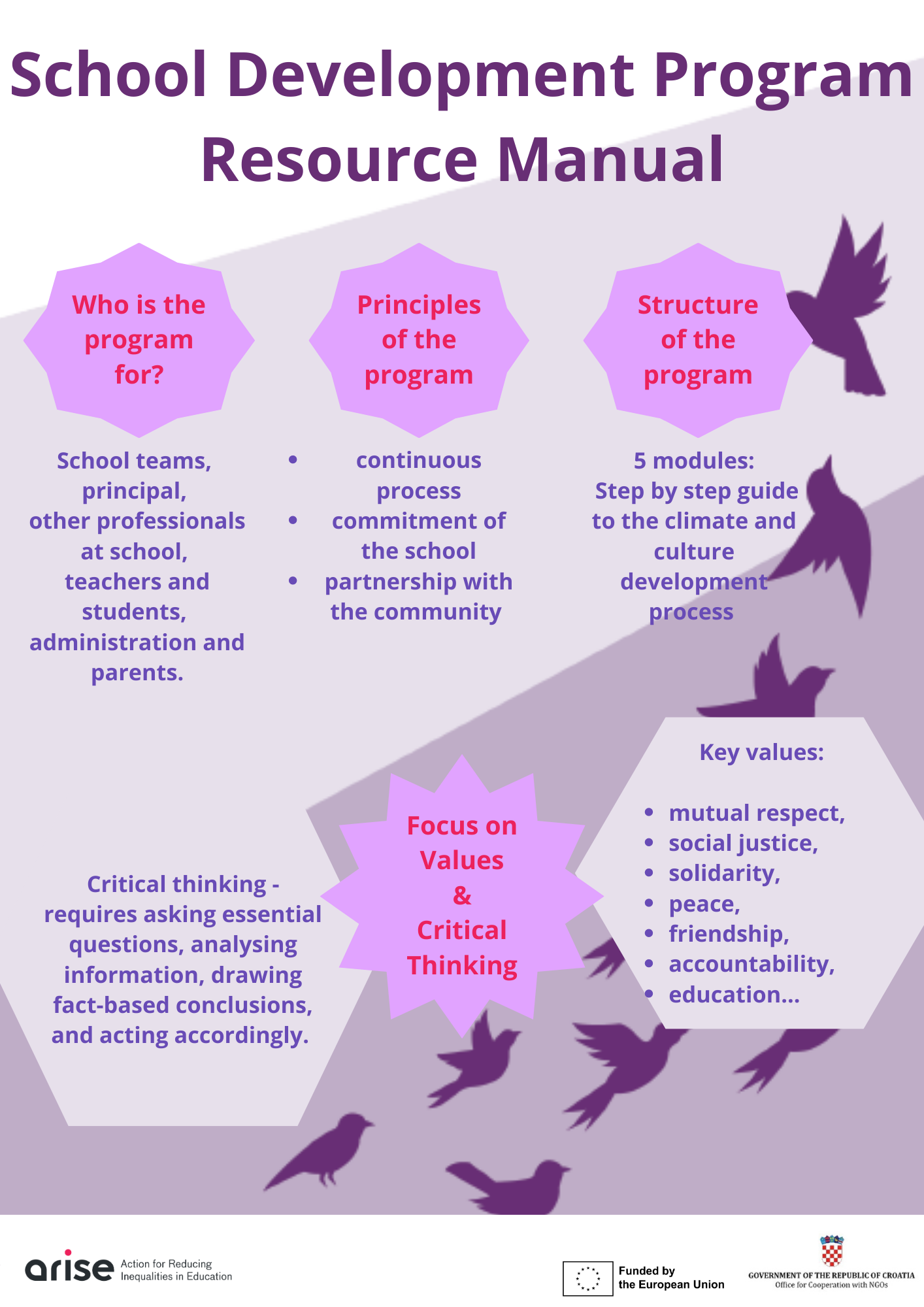We are presenting you the school development program resource manual intended primarily to empower schools in the process of creating a safe environment for every child.
The crucial role of education in breaking the circle of poverty has been recognized and emphasized in various human rights’ documents. For example, according to the Universal Declaration of Human Rights (1984), education shall be free and compulsory (article 26) while Convention on the Rights of the Child (CRC) underlines that education should be available to all children without discrimination (article 28) and that it should be of great quality (article 29)1.
In addition, various studies on economic and social development have also confirmed the significant impact of education on individual’s income, as well as the positive effect it has on all aspects of child development and well-being2.
Even though high quality of education is required in order to fulfil the goals and develop every child’s potential to the fullest, in many countries marginalised students3:
- face poor quality of teaching and learning;
- are in overcrowded classes;
- lack learning materials;
- have insufficient instructional time;
- face gender biases;
- are thought by inadequately trained teachers.
Policy perspective
In the Comparative report developed within the ARISE project, the issues regarding poverty in the participating countries (AL, BH, MK, SR, XK, TR) have been underlined to demonstrate what countries can do to support all of their students, regardless of their SES or any other background.
According to the abovementioned report, one of the most challenging aspects of achieving equity in education is to ensure it both on ‘paper’ and in action, i.e., in policy and practice. Schools cannot be inclusive without inclusive textbooks and subject curriculum and equity needs to be embedded in values, norms and ethos, as well as in legislation and procedures. Even though all countries have made progress towards the establishment of inclusive education in the last 10 years and put it high on the policy agenda, funding is not sufficient, education staff is not always fully trained, communication between stakeholders needs to be improved and some forms of separate provisions are still present in countries (based on disability or language spoken).
You can find more data-driven policy recommendations that aim to support social recognition of the importance of equity in education among educational stakeholders and policymakers in the report which also includes identified good practices and promising solutions for mitigating adverse effects of poverty.
School can make a difference - School development program
Although the quality of education depends on many aspects of educational policies and other circumstances it is the teachers that have the greatest impact on the final result, of the educational process as they proved to be the most critical influence on learning - their attitudes, as well as teaching practices, significantly influence student achievement4.
Moreover, the school plays a major role in the context of the socio-emotional development of youth - especially for youth with risk factors. Students’ educational attainment depends on how they feel in school - research indicates that social environment additionally contributes to educational attainment on top of education itself5.
For all of the abovementioned reasons, the school development program is intended primarily to empower schools in the process of creating a safe environment where every child feels accepted and develops the competences, he or she needs for living and creating a society based on universal human values, mutual respect and support.
The School Development Program Resource Manual is available here.
1 Vranješević, J. 2022, Action for Reducing Inequalities in Education School Development Program – SDP: Resource Manual
2 Bravedu hand book breaking the poverty taboo – creative ideas for mitigating the effects of poverty: school-based activities, 2019
3 Ibid.
4 Ibid.
5 Prosser 1999, according to Vuković Vidačić, 2016 Školska kultura, (36 – 37, 40) [online] Repozitorij Filozofskog fakulteta u Rijeci. Available at: https://urn.nsk.hr/ urn:nbn:hr:186:738178

